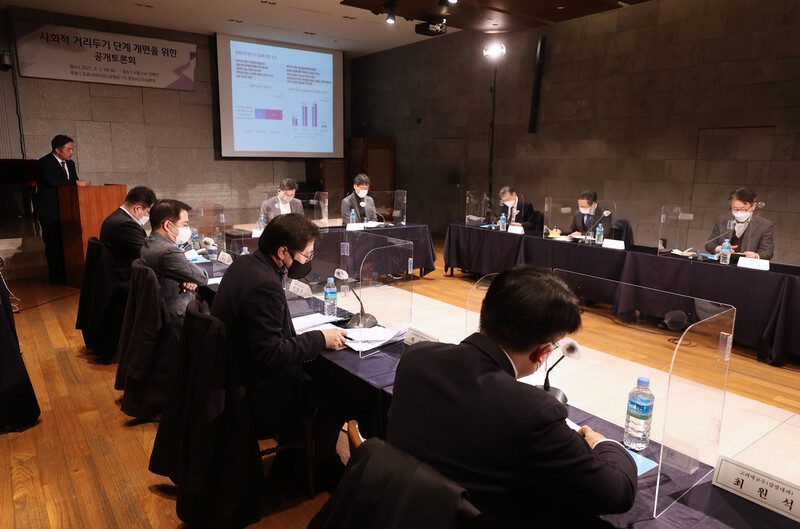
On the morning of the 2nd, the ‘1st Open Discussion for Reorganization of Social Distance Stage’ is being held at the LW Convention in Jung-gu, Seoul. yunhap news
As the government announced the reorganization of the social distancing system after the Lunar New Year holiday, experts are scrambling about the goals, levels, and methods of distancing policies. Some advise that the intensity of distance should be reduced by considering social and economic damage in a balanced way rather than putting weight on minimizing the number of corona19 confirmed cases, while others argue that the duration of damage should be reduced by preemptive high-intensity distance distance during the epidemic. As the corona19 epidemic is prolonged, there is a growing voice that the damage of vulnerable groups such as children, the elderly, the disabled, irregular workers, and homeless people due to distance should not be neglected anymore. On the 2nd, the Central Accident Recovery Headquarters (Jung Soo-bon) held a’first debate for reforming the social distancing system’ at the LW Convention in Jung-gu, Seoul. It is a place to evaluate distance policy in the recent 3rd fashion, gather advice from experts, and reflect it in the reorganization of distance system after the Lunar New Year holidays. At the debate, Professor Yoon Kim of Seoul National University (medical management) and Soon-Man Kwon, professor of Seoul National University Graduate School of Health gave presentations. Professor Soongsil University (Venture Small and Medium Business) and Chung-Hee Lee Professor (Department of Economics) of Chung-Ang University held a discussion. At the debate on that day, Professor Yoon Kim (medical management) of Seoul National University Medical School said, “You should not’all-in’ (focusing all) on the reduction of the number of confirmed patients, but consider various socio-economic aspects.” “In Korea, the intensity of distance is too high compared to major foreign countries. And, the damage caused by the distance is concentrated on certain classes such as small business owners.” Prof. Kim then analyzed 934 group infections that occurred from August last year to January this year. He said that 8% and 7% of educational facilities were in order, and said, “It is necessary to strengthen the quarantine of companies that have actually suffered a lot of group infections, rather than multi-use facilities with intensive distancing regulations.” “Currently, if a facility does not comply with the quarantine rules and a group infection occurs, all facilities of that type are designated as high-risk facilities and closed. This is a group meeting method,” he said. “You need to keep your distance at an appropriate level, but instead secure enough beds to accommodate the growing number of patients.” On the other hand, there was also a disagreement that efforts to reduce the number of patients through distance are still the core of Corona 19 response. Choi Won-seok, a professor at Korea University’s Ansan Hospital (infectious medicine department), said, “It is inappropriate to recognize that a certain amount of patients in the community is okay.” “Because there is.” He added, “The problem is that there is not enough compensation for the damage caused by distance and the pain sharing of society.” Baek-ju Na, a professor at the Graduate School of Urban Health at the University of Seoul, said, “I think that strengthening distance and ending early in the outbreak is a way to reduce national fatigue and reduce social and economic damage.” It was also pointed out that the government’s response to Corona 19 was insufficient to guarantee the basic rights of individuals. Professor Gu In-hoe of Seoul National University (social welfare) said, “If social welfare facilities, which are not multi-use facilities for leisure activities, are banned from operation of social welfare facilities, which are essential for survival, hunger problems for the homeless, social isolation problems for the elderly, and severely disabled people There is a human rights violation that makes even basic life difficult,” he said. “As we have to live with Corona 19 for a considerable period of time, we need to prepare a plan for the socially vulnerable to participate in the quarantine policy decision process.” Joongsubon will hold a second discussion meeting on the 9th to discuss facilities quarantine rules for each stage of distance, with self-employed persons and economists. Earlier, the government announced its policy to reorganize the quarantine rules for blocking the spread of Corona 19 to the application of’facilities’ to’actions’. By Choi Ha-yan, staff reporter [email protected]
